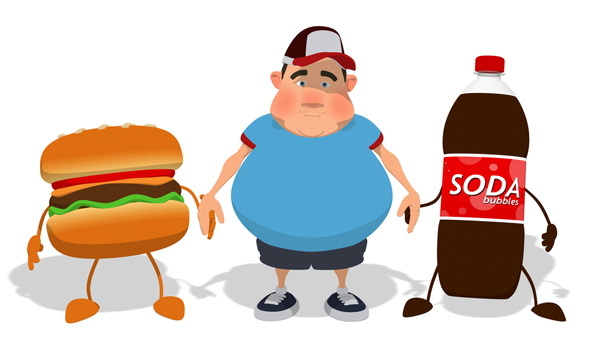Why are so many Americans—69.2 percent to be exact—overweight or obese? The answer seems obvious: We’re taking in more calories than we expend. But why is that? Check out these seven common weight gain triggers.

We slurp down sugary drinks.
This includes sodas, fruit drinks, sweetened iced tea and other beverages that cost about 140 to 150 calories per 12-ounce serving. They are a major source of added sugar in our diet. Guzzle just one can daily on top of your actual calorie needs and you could gain 15 pounds a year. A Canadian study that tracked toddlers found that those who drank more sugary beverages were 2.5 times more likely to be overweight compared to those who didn’t.
We consume too little fiber.
This comes from not eating enough fruits, vegetables and whole grains. Aside from making you feel fuller on fewer calories (and thus, satisfying appetite), fiber may also promote a slimming gut flora, the population of trillions of bacteria that reside in our gut that are thought to influence everything from immunity to anxiety to obesity risk.
We’re wired for obesity.
What you ate as a fetus, infant and small child can affect your genes—actually programming them to make you fatter. For instance, if a mom is overweight or obese during her pregnancy, it’s more likely that that child will become overweight as an adult. If that same mom has a second child when she’s not overweight, the odds are much lower that child number two will go on to become an overweight adult. Her two children share similar genetics, but their in utero environment was different.
We don’t exercise.
Nearly 40 percent of Americans get virtually no exercise. In states where people get the least amount of physical activity—Mississippi, Louisiana, Tennessee, Alabama—obesity rates are highest.
We don’t have the resources.
To stay in shape, you need the education to pick the right foods, the money to buy them, and the time to get to the gym (working two jobs to make ends meet makes this tough). The poorest ethnic groups in the U.S.—blacks and Hispanics—have up to 47 percent higher obesity rates than the generally wealthier whites.
We skimp on sleep.
Studies show that people who sleep less than seven hours nightly are more likely to be obese than those who sleep seven to eight hours. (For more on the sleep-weight connection, click here.) A French study showed that after getting just four hours of sleep, men ate 22 percent more (559 extra calories) compared to when they slept eight hours.
We’re stressed out.
It’s why they call mashed potatoes, baked ziti, pizza and cookies “comfort foods.” When you’re stressed, these are the extra-fattening foods you tend to turn to because they make you feel better.
Also Read:
